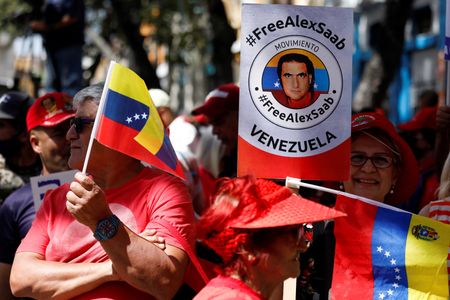By Jonathan Landay and Vivian Sequera
WASHINGTON/CARACAS (Reuters) – The United States is not discussing a prisoner exchange as described in a letter and video appeal addressed to President Joe Biden by an American detained in Venezuela, according to two U.S. officials.
Eyvin Hernandez was “quite possibly coerced” into appealing to Biden to swap him and seven other U.S. detainees for Alex Saab, a Colombian-born businessman facing trial in Miami, said one of the U.S. officials, speaking on condition of anonymity.
Hernandez, a 35-year-old Los Angeles public defender, sent the letter and video to Biden in February.
“I’m making this appeal to you on behalf of myself, my family, my friends, and all the other U.S. Americans that are here, unlawfully detained in Venezuela,” Hernandez said in the video, which was reviewed by Reuters and is being reported for the first time. “We know that we will be released if you make a trade for Alex Saab for all of us.”
His letter, also reviewed by Reuters, was previously reported by Newsweek.
The Venezuelan Ministry of Information did not respond to questions about whether a prisoner swap was being considered, or whether Hernandez was coerced into making his appeal.
In the video, Hernandez says swapping him and the other detainees for Saab, a long-time ally of Venezuelan President Nicolas Maduro, would be the “only way” they could be freed.
Saab is charged with siphoning around $350 million out of Venezuela through the U.S. in a bribery scheme linked to Venezuela’s state-controlled exchange rate. He denies the allegation. No date has been set for his trial.
Declining to comment on the specifics of any ongoing case, a U.S. State Department spokesperson appeared to indicate that talks on a prisoner swap involving Saab might be possible after his trial ran its course.
The spokesperson cautioned against any reporting that suggested a deal had been reached to secure the release of an American wrongfully detained in Venezuela, “or that there are active conversations about releasing a major U.S. criminal suspect who hasn’t even gone to trial.”
The first U.S. official also said no negotiations were underway.
Hernandez’ brother, Henry Martinez, told Reuters by WhatsApp from Los Angeles that the family had received no official information from U.S. officials about any possible exchange.
FOCUS ON FREEING AMERICANS
Biden says freeing Americans wrongfully detained overseas is a top priority. He has presided over a number of swaps, notably one in December in which basketball star Brittney Griner was released by Moscow in exchange for convicted Russian arms dealer Viktor Bout.
In the video, Hernandez was unshaven. He appeared well-fed, sitting in a green sweatshirt over a blue shirt and pants. The hand-written letter lay on a desk before him.
Reuters was unable to learn how the video and letter were conveyed to the White House. That Hernadez was allowed to make them indicated Venezuelan authorities approved.
In his letter, Hernandez wrote that his appeal for was backed by three other U.S. detainees: Jerrel Kenemore, Jason Saad and Joseph Cristella.
The Biden administration in October declared Hernandez wrongfully detained. He and Kenemore, 53, were arrested in March 2022 on charges of illegally entering Venezuela from Colombia.
Caracas in October released seven Americans in exchange for two of Maduro’s relatives convicted on drug trafficking charges in the United States, amid talks between U.S. and Venezuelan officials that began in March 2022.
The talks marked a shift in U.S. policy from the Trump administration’s “maximum pressure” campaign of sanctions and other measures aimed at forcing Maduro from power following 2018 elections widely deemed fraudulent.
Venezuela has the world’s largest proven oil reserves. The Biden administration has been seeking alternative oil sources because of disruptions related to the war in Ukraine.
Washington says Maduro’s government must take concrete steps toward free elections and release detained politicians before it considers any easing of sanctions.
(Additional reporting by Simon Lewis from Washington; Editing by Daniel Wallis)





